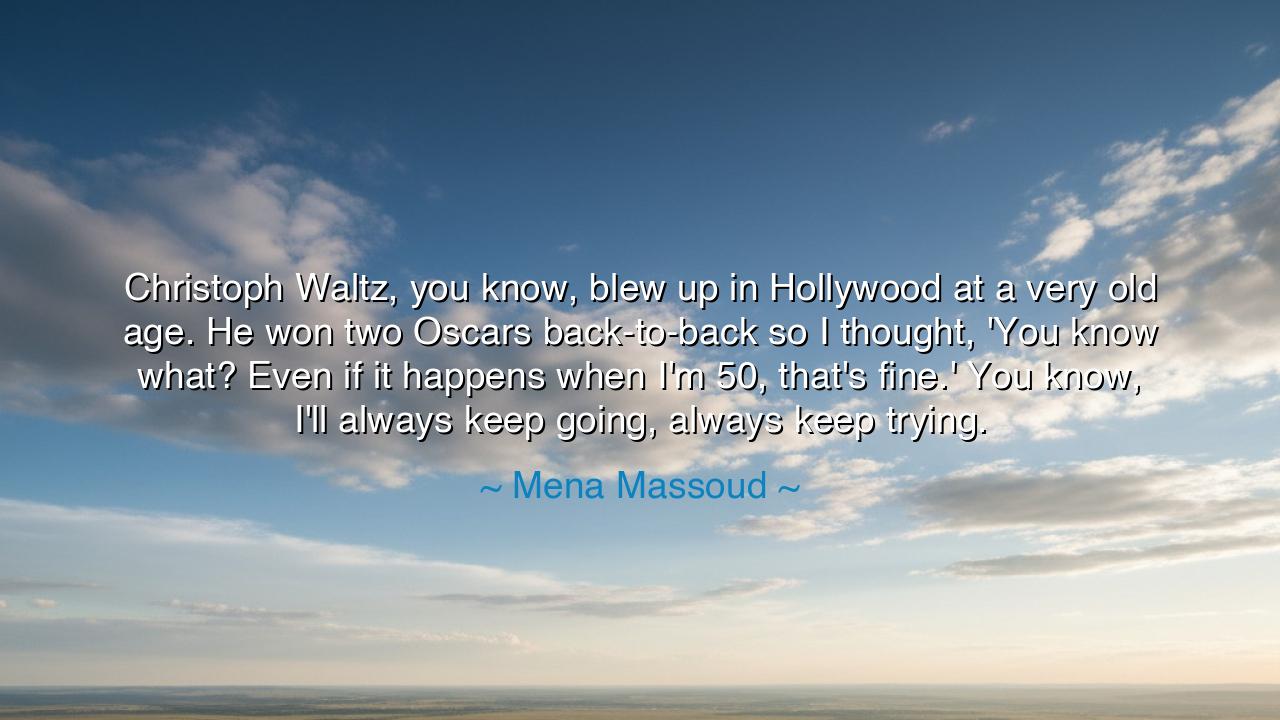
Christoph Waltz, you know, blew up in Hollywood at a very old
Christoph Waltz, you know, blew up in Hollywood at a very old age. He won two Oscars back-to-back so I thought, 'You know what? Even if it happens when I'm 50, that's fine.' You know, I'll always keep going, always keep trying.






"Christoph Waltz, you know, blew up in Hollywood at a very old age. He won two Oscars back-to-back so I thought, 'You know what? Even if it happens when I'm 50, that's fine.' You know, I'll always keep going, always keep trying." These words, spoken by the aspiring actor Mena Massoud, carry a profound message of resilience and the unwavering pursuit of dreams, no matter how long the road may seem. In a world that often celebrates youth, we sometimes forget that greatness does not come with an expiration date. Massoud’s reflection on Christoph Waltz’s late-blooming success in Hollywood serves as a powerful reminder that success can arrive at any age, and that it is the persistence and dedication to one’s craft that ultimately lead to triumph.
The story of Christoph Waltz’s rise to fame is nothing short of legendary. After years of steady work in European cinema, Waltz found international acclaim in his late 40s, winning Academy Awards for his performances in Inglourious Basterds and Django Unchained. His journey exemplifies the ancient truth that greatness is often not achieved in the prime of youth but in the maturity of one’s years. This mirrors the story of many great philosophers and leaders throughout history. Socrates, for example, did not begin his philosophical inquiries until late in life, and yet he became the cornerstone of Western thought. Waltz’s story, much like Socrates’, reminds us that the pursuit of mastery and wisdom is not bound by age—it is bound by a relentless commitment to continue the journey, regardless of when success comes.
The power of Massoud's words lies in their unwavering optimism. He looks to Waltz as an example of hope, understanding that age is not an obstacle but a part of the natural progression of a person’s life. This is not a new idea but one that has echoed through the ages. Seneca, the Roman philosopher, spoke at length about the importance of patience and fortitude in the face of time. He argued that the true measure of a person’s life is not how quickly they achieve their goals, but how they respond to the passage of time. Just as Seneca advised that one should not waste the years lamenting lost opportunities, Massoud draws inspiration from Waltz’s example to persevere in his own journey. Age, in this light, is not something to fear, but something to embrace, for with age comes experience, insight, and the potential for new beginnings.
We see this truth reflected in the stories of other great figures whose achievements bloomed late in life. Colonel Sanders, the founder of KFC, did not start his restaurant empire until his 60s. His journey, though filled with rejection and struggle, ultimately led to the creation of one of the world’s most recognized brands. This tale of late success is a testament to the power of persistence, much like the story of Waltz. The lesson from Colonel Sanders and Waltz is that success is not measured by the time it takes to achieve, but by the commitment to continue the journey, no matter when it happens.
The significance of Massoud’s reflection is a call to action for all who feel the weight of time on their shoulders. It is a reminder that it is never too late to begin or to redefine one’s journey. Whether we are 20 or 50, the pursuit of our dreams should not be limited by age or societal expectations. Just as Michelangelo, who created some of his most famous works in his later years, showed that creativity and genius are timeless, we too must believe that our time to shine may come when we least expect it. The power of Massoud’s words lies in his commitment to keep moving forward, regardless of when the world recognizes his efforts.
In practical terms, this means that we must all continue to pursue our passions, without fear of when the “right” time will arrive. It may not come in the years we expect, but that should never deter us. Success, as Waltz’s story and many others show, is not a straight line. It is a journey filled with ups and downs, moments of doubt, and moments of triumph. The true key to success is not timing, but resilience—the ability to continue working, learning, and growing regardless of when recognition comes.
Therefore, let us take the example of Christoph Waltz and Mena Massoud to heart. Let us remind ourselves that it is not age or time that defines us, but our determination to keep striving, to keep growing, and to keep learning. We must understand that greatness may not come when we expect it, but it will come if we remain persistent. Like Waltz and Massoud, we must continue to dream, to work, and to believe, knowing that each day brings us closer to the moment when our own success will bloom, regardless of when it arrives. The lesson is clear: the path to greatness is not bound by time, but by the courage to keep trying, no matter where we are on the journey.






AAdministratorAdministrator
Welcome, honored guests. Please leave a comment, we will respond soon